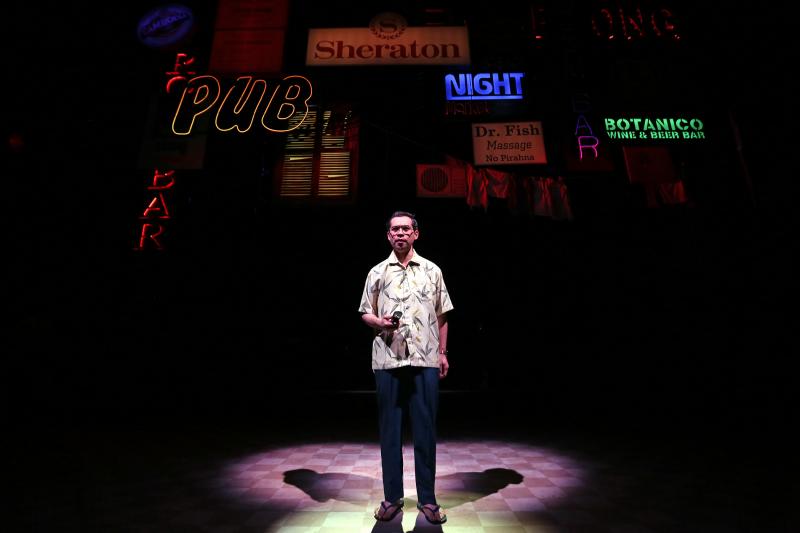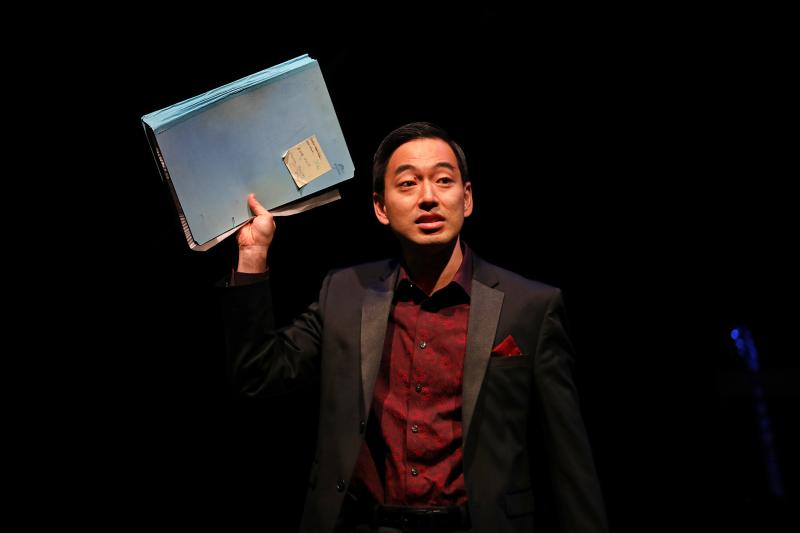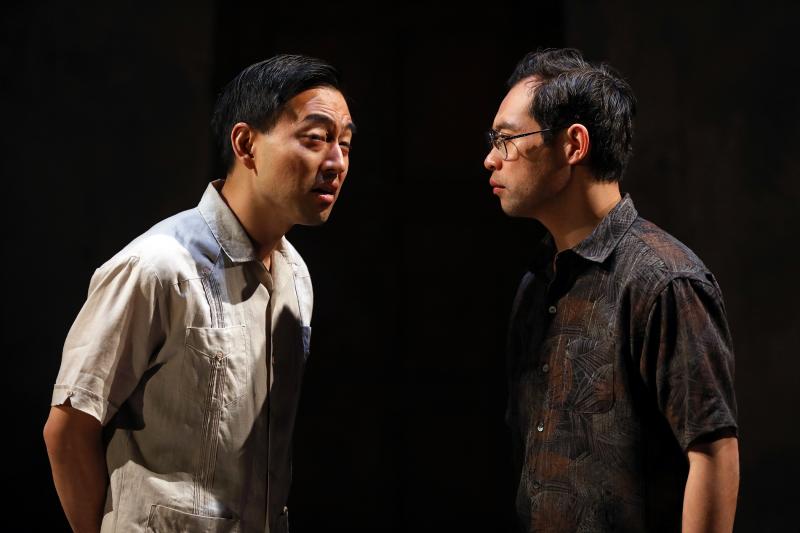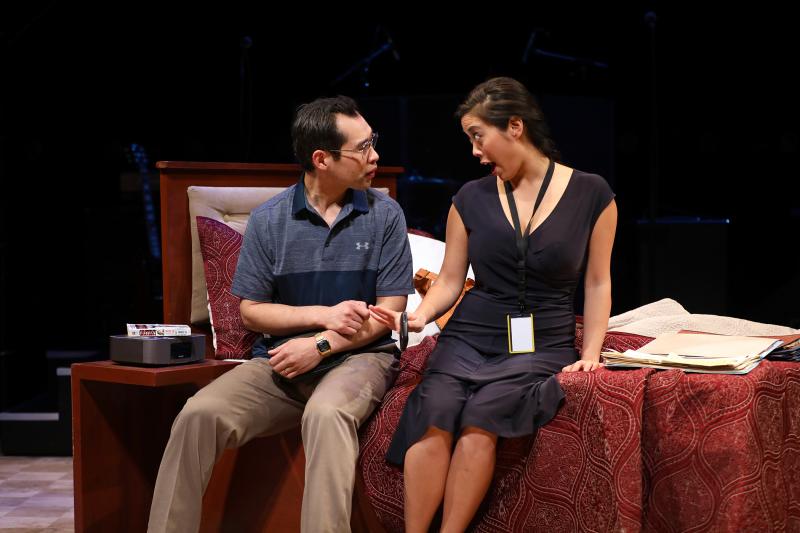Review: Powerful New Play CAMBODIAN ROCK BAND Makes World Premiere at South Coast Repertory
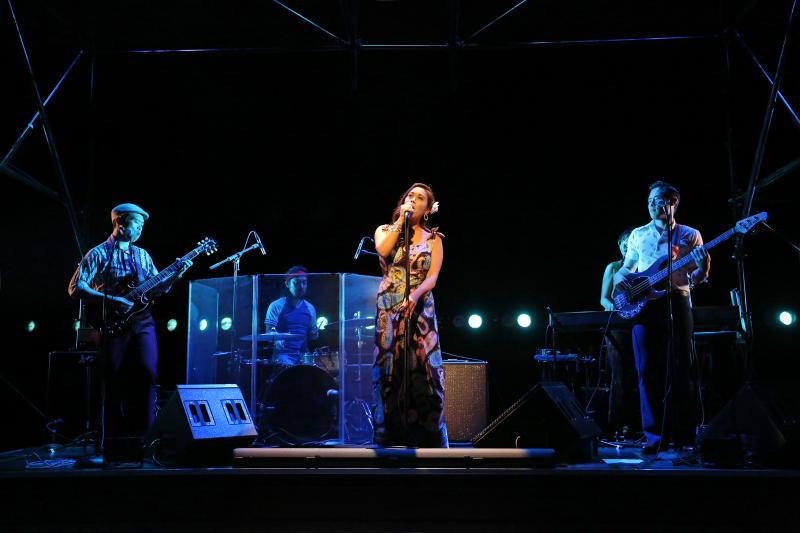
The world, unfortunately, is rife with truly horrific examples of inhuman atrocities throughout its recorded history---from the subjugating of entire races into slavery to the mass executions of entire populations for the sake of complete and unchallenged control. In all instances, the human pain and suffering are long-lasting and far-reaching to say the least.
Such was the case in the Southeast Asian country of Cambodia, a region that, for much of its history, has experienced a great deal of hardships and challenges, some of which even continue through today.
But, of course, as the world soon discovered, its citizens endured the worst of these horrors during the bulk of the 1970's, the decade that first saw the country mired in civil war followed by, in 1975, the rise of the Khmer Rouge regime---under its leader Pol Pot---to ultimate power. From that point on, this new ruling faction enacted a steady stream of extreme torture, forced incarcerations, and, yes, mass genocide throughout the country. The brazen jailing, torturing, and murdering of its citizens---often with little to no evidence of supposed "crimes" or opposition to the ruling government---became the daily reality in Cambodia.
The regime's stronghold over the nation eventually ended in 1979 after being ousted by Vietnamese factions and members of the People's Republic of Kampuchea. And when the dust and debris finally settled, the world was in collective shock to learn of "the Killing Fields," and that the death toll under the Khmer Rouge numbered in the millions.
This tragic piece of history serves as the overarching backdrop that links the past and the (near) present in Lauren Yee's stunning new play CAMBODIAN ROCK BAND---which continues its World Premiere production at Orange County's Tony Award-winning regional theatre South Coast Repertory in Costa Mesa through March 25, 2018. Commissioned by SCR as part of its CrossRoads Initiative, this powerful and searing new drama---sprinkled with welcome bits of comedy and, yes, rock concert music interludes---had its initial staged reading at last year's Pacific Playwright's Festival and is now an absorbing, full-fledged production under the admirable direction of Chay Yew.
While not a musical in the traditional sense, the play---as the title demands---does feature intermittent breaks of music throughout, performed by a fictional rock band that calls itself Cyclo. The rousing, talented quintet performs Khmer-language songs but in Western-style rock reminiscent of late 60's music---whose sounds span the spectrum between guitar-shredding Woodstock headliners, message-heavy folksongs, and the whimsical playfulness of The Beach Boys.
But in actuality, the play integrates original songs by the popular Cambodian group Dengue Fever, a contemporary Cambodian rock band that performs today as a throwback tribute act paying homage to the kinds of bands that flourished in their native country---that is before the terrible genocide occurred that erased most (if not all) of these musicians out of existence.
Because any sort of creative or artistic pursuits were vehemently prohibited under the Khmer Rouge regime, hundreds of thousands of musicians as well as teachers, philosophers, artists, and other citizens deemed "intellectuals" with supposed opposing views were all deemed a danger to the country and were therefore summarily imprisoned and tortured and, eventually, executed. Very little exists of the music created pre-Khmer Rouge, so Dengue Fever has positioned itself as one of the main revivalists of this long lost Cambodian art form.
Though the Dengue Fever songs used in CAMBODIAN ROCK BAND are not translated for audience members who don't speak the language, they don't take anything away from what transpires in the play (the songs do not move the story forward, but only gives a sort of general "mood" to the events that transpire).
Cyclo's sets occur in the capital city of Phnom Penh, five years before the fall of the city to the Khmer Rouge. Before the band could finish one of their opening songs, a lithe, manic figure emerges from out of nowhere. This unidentified snarky man (played brilliantly by Daisuke Tsuji) proceeds to break the fourth wall like the Engineer in MISS SAIGON or the Emcee from CABARET---and speaks directly to the audience, eliciting laughs for his funny comments about the proceedings and some of the more "boring" aspects of the exposition. Of course, we instantly like him.
He tells the band to scram, and the dejected band members walk off into the wings as our narrator lets the audience know that he would be appearing from time to time during these early scenes because, frankly, his actual part in the story doesn't occur until more than halfway into the play---which, we happily agree, would be quite a disservice to our enjoyment (haha).
He ushers us forward to 2008 where we meet Chum (the remarkable Joe Ngo), an awkwardly goofy but generally jovial Cambodian man in his 50's who has just arrived in Phnom Penh after a long flight from his home in Massachusetts in the United States. He is there, apparently, on "vacation" and to surprise his grown daughter Neary (the excellent Brooke Ishibashi) who herself has been in Phnom Penh for a while working on a case on behalf of the Center for Transitional Justice, a non-profit global humanitarian and human rights organization that seeks to investigate and punish war criminals.
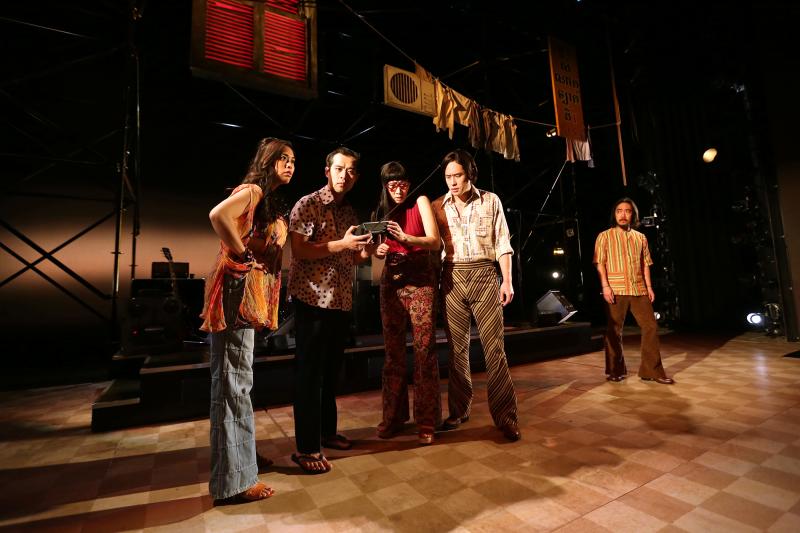
From the moment Chum shows up at his daughter's hotel room unannounced, the air is thick with tension. The nervous Neary is unsure why her father has shown up without any warning in Cambodia. Chum, for his part, is mentally all over the place: suggesting a trip to a day spa one moment, then lecturing her daughter about going to Cornell Law School to get a higher-paying job the next---even though Neary's noble job is one most parents would be proud about (on a side note, the scene is remarkably similar to many conversations with my own Asian family!)
It's clear the gap that exists between father and daughter is much more than just a generational one. Both father and daughter can't seem to say the right thing to the other, and both have difficulty expressing affection or their true, snark-free feelings for one another.
She is, naturally, horrified when her colleague and boyfriend Ted (the likable Raymond Lee) emerges from the bathroom with just a towel on, still dripping wet from the shower. Curiously, Chum is less bothered by this than he is of Neary's hotel room accommodations. But it is this same boyfriend who also urges Neary to tell her father what she's been working on---a groundbreaking case that will surely make her father proud of the work she is doing.
With slight reluctance, Neary tells her father about a press conference she's conducting, where they will announce to the Cambodian and world populations that she and her colleagues are prepared to bring war crime charges on a former Khmer Rouge operative named Duch who once ran the country's notorious S21 prison. She urges her father to attend, but Chum, visibly shaken, does not want any part of such proceedings.
But why? The easy answer, of course, is that Chum---a refugee who fled Cambodia and immigrated to the United States to establish a better life---wants to desperately keep the past shoved into the deepest recesses of his mind. For many in the Cambodian community that survived and lived and escaped the horrors of this genocidal regime, the memories of what they've had to leave behind are just too painful to revisit and recall. In turn, for many children of Cambodian refugees---and, to a certain extent, the children of any people who have had to escape such horrific events---this means a life of not knowing first-hand what that harrowing past life was really like, creating a wider generational gap that's not easy to bridge. As parents suffer through their trauma in silence, their children, too, are silent, afraid to breech the subject and weary for causing their parents to express pain and frustration.
In CAMBODIAN ROCK BAND, Yee constructs a riveting play that's part mystery, part history lesson, and part unabashed jukebox musical concert. Hints of soap opera-like melodrama is kept to an acceptable minimum, but enough to entice those of us that can get swept up with such devices. Humorous lines that are generously peppered yet never intrusive or trite allow for breaks in the drama which can go from haunting to devastating. For a world premiere piece, the play feels close to perfect.
The first act, which establishes the mystery, is slowly solved one puzzle piece at a time in the darker, more dangerous second act. But at its very core, the play is really about the father-daughter relationship that needs desperate patching up. Over the course of the play, we witness a father and daughter reconcile with the past in order to move forward with a better understanding of each other. Heartbreaking yet ultimately touching, this play gives its subject matter an authentic cultural specificity, yet is universally relatable and absorbing as a story of one family's enduring spirit in the face of monstrous atrocities.
The play's six talented cast members, of course, bring Yee's words to vivid life, while at the same time doing double-duty as members of the fictional band Cyclo (except for Tsuji---though, in fairness, he is a champ on the tambourine).
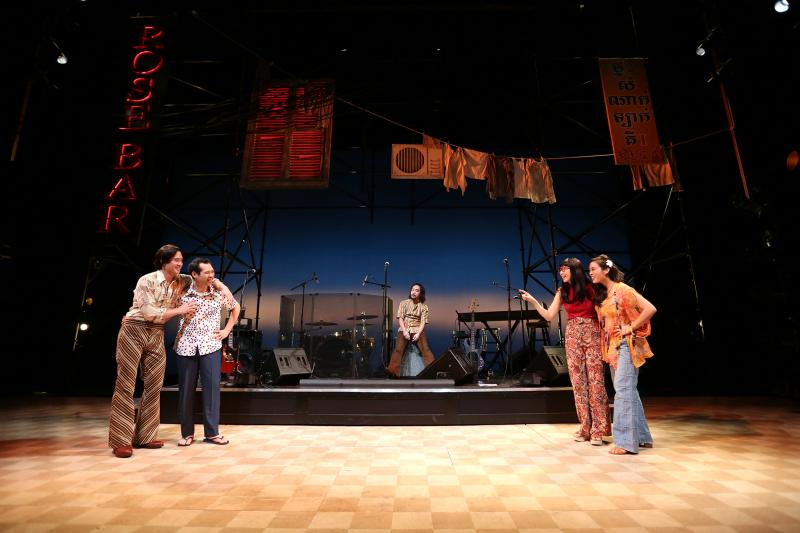
As Chum, Ngo (who is also Cyclo's lead guitarist) portrays his lead role with a beautiful sense of squelched energy---someone who can be manic and excitable one minute and then completely guarded and vulnerable the next. Of all the actors, Ngo goes from one end of the emotional spectrum to the other the most, establishing this incredibly lively character whose journey keeps you at the edge of your seat. In the role of Chum's daughter Neary, Ishibashi (who is also Cyclo's hard-rocking, scream-tastic lead singer) is the play's relatable portal for the Western-leaning audience---an American-raised daughter of immigrants desperate to make her mark in the world while at the same time still be that little girl still wishing for some kind of affectionate approval from her father. Her tense arguments with Ngo are especially engaging to watch as the two spar with no clear "winner" in sight.
As Duch, Tsuji is a mesmerizing presence that captures your attention the second he enters. He goes from energetically playful and clown-like to quietly menacing AF with just a turn of phrase. Though he first introduces himself as a narrator, revealing nonchalantly that he actually plays a much more significant part in this unspooling father-daughter story, you always feel like he's addressing the audience, trying to be our snarky color commentator when, in fact [SPOILER ALERT] he has a much more sinister role in these people's lives that will make you shudder. Tsuji is incredible in this play. Lee, who plays Neary's boyfriend Ted as well as Chum's pal Leng (Cyclo's bassist) does a great job in portraying his distinct roles which happen to both carry a sense of confidence.
Abraham Kim and Jane Lui round out the cast as the drummer and keyboardist/vocalist (respectively) of Cyclo, while also appearing in minor but still memorable roles in the play. When the five members of Cyclo do perform together, it's like truly being at a rock concert, aided tremendously by Mihail Fiksel's sound design and David Weiner's stadium-like lighting. Musical director Matthew MacNelly establishes the Cyclo sound into the play seamlessly and purposefully not as unwelcome pauses but rather as a space for characters (and the audience) to take a collective breath to ruminate on what just happened and what's (maybe) about to happen.
Visually, the creative team keeps things simple but effectively timely. Cyclo mostly performs on a mobile stage during their concert portions, but this retractable platform recesses upstage to reveal a minimalist set designed by Takeshi Kata and Se Hyun Oh (their versions of Phnom Penh---from the neon-lined street signs of pre- and post-war Cambodia to the drab walls of S21 prison---gets the gist). Meanwhile Sara Ryung Clement's costume designs establish exactly where we are on the timeline of the play, which often jumps back and forth at any given scene change. The groovy late 60s/early 70s fashions are vintage heaven while the stark garb of the Khmer Rouge era utilizes a color palette that mirrors its harrowing events. Chum and Neary's 2008 clothes are appropriate to their personalities. While Duch's clothes don't betray his timeless role as a narrator.
Overall, CAMBODIAN ROCK BAND is an excellent first production of this incredibly engrossing story with the added bonus of hearing a great sampling of the kind of music that an evil regime tried its best to wipe off from the face of the earth. Like all great art, it somehow will find an audience no matter what.
And on a more personal level... after just recently seeing the touring production of the Tony-winning revival of THE KING AND I visit the O.C. followed by seeing the superb new production of the musical ALLEGIANCE in Los Angeles, CAMBODIAN ROCK BAND is---by fortuitous happenstance---now the third live stage production I have seen in these past few weeks that features a predominantly Asian cast. I cannot adequately describe how much my heart is full of pride and joy at seeing the amazing talent on stage that have faces and stories of people that look like myself---mostly because it's such a rarity. Although I am neither Thai, Japanese or Cambodian---the subject of these stories---the mere sight of Asian actors (of different ethnic backgrounds) reminds audiences that our stories and faces are worth experiencing, too.
While talk of the need for diversity in all facets of entertainment has continued to be part of the national conversation (and in some cases, put beautifully into practice), it saddens me that people of Asian descent are still so sadly and overwhelmingly under-represented. So I suppose it is no surprise that I haven't had this much pleasure overusing a couple of hashtags --- #AsiansOnStage and #RepresentationMatters ---on social media. Experiencing these trio of productions in a row is definitely a step in the right direction that, I hope, continues to be embraced.
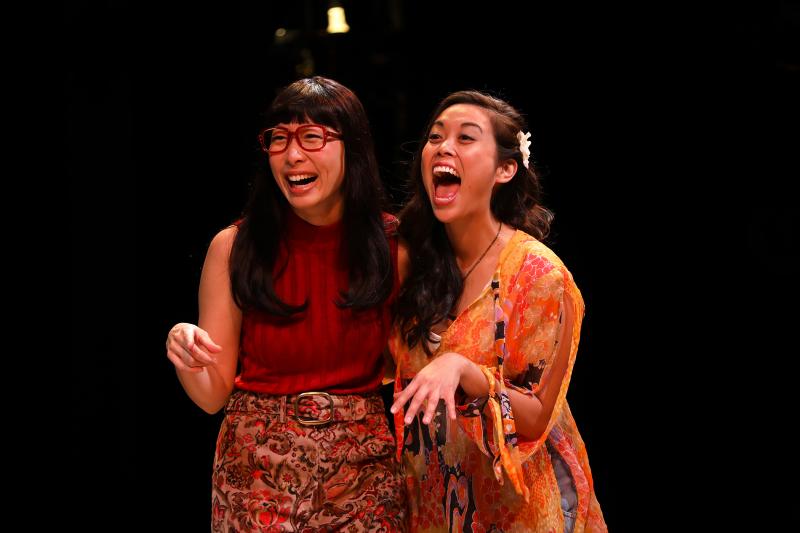
It's just such a shame this marvelous production of CAMBODIAN ROCK BAND was granted such a short run... but something tells me this isn't the last the world will see this remarkable and, frankly, quite important piece of theater. Hurry and catch this while it's here, Orange County.
* Follow this reviewer on Twitter: @cre8iveMLQ *
Photos by Jordan Kubat for South Coast Repertory.
-----
The World Premiere production of CAMBODIAN ROCK BAND continues at South Coast Repertory through March 25, 2018. Tickets can be purchased online at www.scr.org, by phone at (714) 708-5555 or by visiting the box office at 655 Town Center Drive in Costa Mesa.
Reader Reviews
Videos


